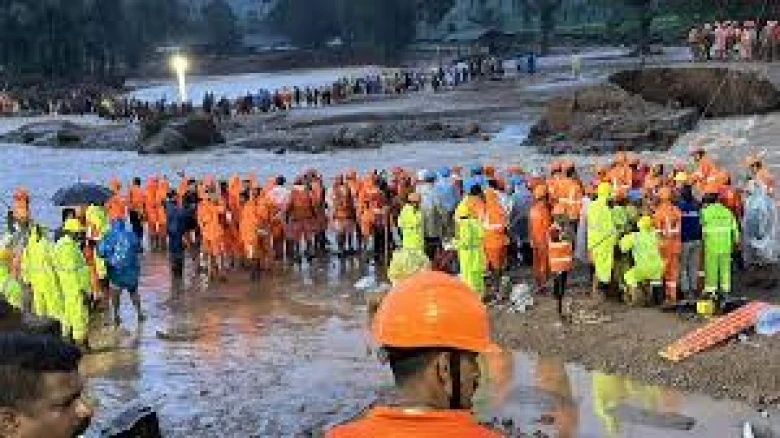Scientists point to climate change as a factor increasing landslide risks in the Western Ghats, one of the world's "hottest hotspots" of biological diversity.
Digital Desk: Kerala's Wayanad district was struck by multiple landslides, resulting in the deaths of over 150 people so far on Tuesday. Nearly 1,000 individuals have been rescued, but more than 180 people remain missing. The landslides, which affected the Mundakkai and Chooralmala areas, also destroyed more than 300 homes. The landslides occurred between 2 am and 4:10 am. The cause of these devastating landslides has been linked to several factors.
Studies indicate that climate change, fragile terrain, and deforestation are significant contributors to the landslides. According to a landslide atlas published by the Indian Space Research Organisation’s (ISRO) National Remote Sensing Centre last year, 10 out of India’s 30 most landslide-prone districts are in Kerala, with Wayanad ranked 13th. The report highlighted that 0.09 million square kilometers in the Western Ghats and Konkan hills (spanning Tamil Nadu, Kerala, Karnataka, Goa, and Maharashtra) are susceptible to landslides. It noted that the Western Ghats, particularly in Kerala, have high population and household densities, which exacerbates vulnerability.
A 2021 study by Springer identified all of Kerala's landslide hotspots within the Western Ghats, specifically in the districts of Idukki, Ernakulam, Kottayam, Wayanad, Kozhikode, and Malappuram. It also reported that approximately 59% of landslides in Kerala occurred in plantation areas.
A 2022 study on Wayanad’s declining forest cover revealed that 62% of the district's forests were lost between 1950 and 2018, while plantation cover increased by around 1,800%. The study, published in the International Journal of Environmental Research and Public Health, noted that about 85% of Wayanad was forested until the 1950s.
Scientists point to climate change as a factor increasing landslide risks in the Western Ghats, one of the world's "hottest hotspots" of biological diversity. S Abhilash, director of the Advanced Centre for Atmospheric Radar Research at Cochin University of Science and Technology (CUSAT), told PTI that warming in the Arabian Sea is creating deep cloud systems, which result in intense rainfall in Kerala and heightened landslide risks.
"Our research indicates that warming of the southeast Arabian Sea is leading to atmospheric instability, which promotes the formation of deep clouds and increased rainfall," Abhilash said. He added that this kind of intense rainfall was previously more common in the northern Konkan belt, north of Mangalore. Research by Abhilash and others, published in the npj Climate and Atmospheric Science journal in 2022, found that rainfall along India's west coast is becoming increasingly convective.

Leave A Comment